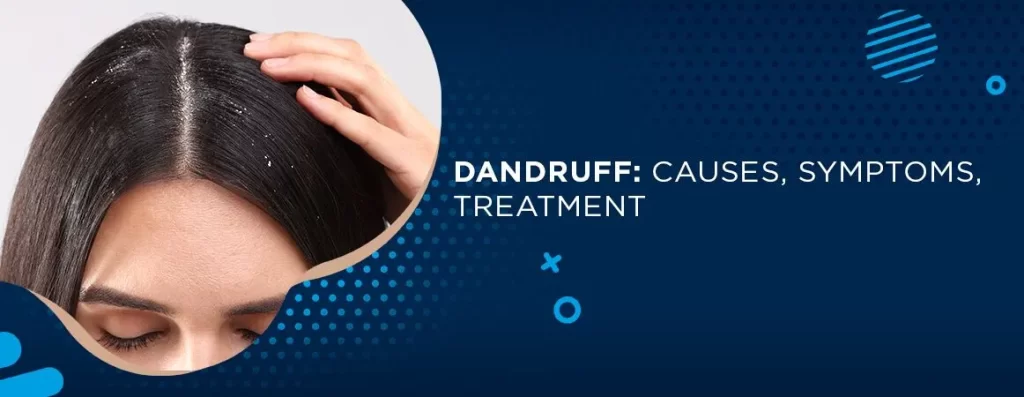Dandruff: Causes, Symptoms, Treatment
Causes of Dandruff
The reasons for dandruff can vary, and it’s often a combination of factors that contribute to its development. Here are some common causes:
- Seborrheic Dermatitis: This condition affects areas of the skin that have a high number of oil glands, including the scalp. It causes oily, red skin with flaky yellow or white scales.
- Malassezia: This yeast-like fungus lives on the scalps of most adults. While it is usually harmless, an overgrowth can irritate the scalp and cause more skin cells to grow, leading to dandruff.
- Dry Skin: People with dry skin are more prone to dandruff. The flakes from dry skin are usually smaller and less oily than those caused by seborrheic dermatitis.
- Hair Care Products: Sensitivity to certain hair care products can cause a red, itchy, scaling scalp. Overuse of shampoo or not rinsing shampoo out thoroughly can also irritate the scalp.
- Skin Conditions: Conditions like psoriasis and eczema can also cause dandruff. These conditions lead to an accumulation of dead skin cells on the scalp.
- Diet and Lifestyle: Poor diet, stress, and lack of sleep can exacerbate dandruff. Diets lacking in essential nutrients, particularly zinc and B vitamins, can also contribute to the condition.
Symptoms of Dandruff
The first step to a successful dandruff treatment is identifying the symptoms. Common symptoms include:
- Flakes: White or yellow flakes of dead skin that appear on the scalp, hair, and shoulders.
- Itching: An itchy scalp is often a telltale sign of dandruff.
- Redness: The scalp may appear red or irritated.
- Oily Patches: In cases of seborrheic dermatitis, the scalp can develop greasy, oily patches.
Dandruff Treatment
Effective dandruff treatment involves a combination of proper scalp care, lifestyle changes, and sometimes medicated products. Here are some approaches:
- Dandruff Shampoo: The first line of treatment often involves using a dandruff shampoo. It’s essential to use these shampoos regularly and follow the instructions on the label.
- Scalp Care Routine: Maintaining a good scalp care routine can help manage dandruff. This includes regularly washing your hair with a mild shampoo to reduce oiliness and dead skin buildup. Avoid using harsh hair products since they may irritate your scalp.
- Moisturize: If dry skin is the cause of your dandruff, using a conditioner or a moisturizing scalp treatment can help keep your scalp hydrated.
- Diet and Lifestyle: Eating a balanced diet rich in zinc, B vitamins, and healthy fats can improve scalp health. Reducing stress through activities like yoga, meditation, and regular exercise can also help manage dandruff.
- Home Remedies: Some home remedies can be effective for dandruff treatment. Tea tree oil, apple cider vinegar, and aloe vera are known for their anti-inflammatory and antifungal properties. These can be applied to the scalp to help reduce dandruff.
- Medical Treatment: In severe cases, a dermatologist might prescribe stronger medicated shampoos or topical steroids. These treatments are typically used for short periods to reduce inflammation and severe scaling.
Preventing Dandruff
Preventing dandruff involves maintaining a healthy scalp and lifestyle. The following advice will help prevent dandruff:
- Regular Hair Washing: Wash your hair regularly with a gentle shampoo to prevent oil and dead skin buildup.
- Healthy Diet: Ensure your diet includes plenty of fruits, vegetables, and lean proteins to provide essential nutrients for scalp health.
- Reduce Stress: Practice stress-reducing techniques like meditation, deep breathing, and regular exercise.
- Avoid Harsh Products: Steer clear of hair products with strong chemicals and perfumes that might irritate the scalp.
- Stay Hydrated: Drink plenty of water to keep your scalp well-hydrated.
Conclusion
Dandruff is a common but manageable condition. By understanding the reasons for dandruff, recognizing its symptoms, and implementing effective dandruff treatment strategies, you can keep your scalp healthy and flake-free. Whether using a specialized dandruff shampoo, following a good scalp care routine, or making lifestyle changes, taking proactive steps can help you manage and prevent dandruff effectively.
Post Disclaimer
The information contained in this post is for general information purposes only. The information is provided by "Dandruff: Causes, Symptoms, Treatment "and while we endeavour to keep the information up to date.
Legal Disclaimer
We do not claim to cure any disease which is considered’ incurable ‘ on the basis of scientific facts by modern medicine .The website’s content is not a substitute for direct, personal, professional medical care and diagnosis. None of the medicines mentioned in the posts ,including services mentioned at "medicineguide.us" should be used without clearance from your physician or health care provider.
Testimonials Disclaimer– : Results may vary, and testimonials are not claimed to represent typical results. The testimonials are real, and these patients have been treated with homeopathy treatment from our clinic . However, these results are meant as a showcase of what the best, Medicine can do with their disease contions and should not be taken as average or typical results.


